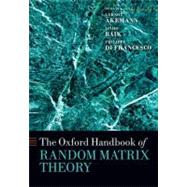
Note: Supplemental materials are not guaranteed with Rental or Used book purchases.
Purchase Benefits
Looking to rent a book? Rent The Oxford Handbook of Random Matrix Theory [ISBN: 9780199574001] for the semester, quarter, and short term or search our site for other textbooks by Akemann, Gernot; Baik, Jinho; Di Francesco, Philippe. Renting a textbook can save you up to 90% from the cost of buying.
| Forward | |
| Introduction | |
| Guide to the Handbook | |
| History | |
| Properties of Random Matrix Theory | |
| Symmetry Classes | |
| Spectral Statisitics of Unitary Emsembles | |
| Spectral Statistics of Orthogonal and Symplectic Ensembles | |
| Universality | |
| Supersymmetry | |
| Replica Approach | |
| Painleve Transcendents | |
| Random Matrices and Integrable Systems | |
| Determinantal Point Processes | |
| Random Matrix Representations of Critical Statistics | |
| Heavy-Tailed Random Matrices | |
| Phase Transitions | |
| Two-Matrix Models and Biorthogonal Polynomials | |
| Loop Equation Method | |
| Unitary Integrals and Related Matrix Models | |
| Non-Hermitian Ensembles | |
| Characteristic Polynomials | |
| Beta Ensembles | |
| Wigner Matrices | |
| Free Probability Theory | |
| Random Banded and Sparse Matrices | |
| Applications of Random Matrix Theory | |
| Number Theory | |
| Random Permutations | |
| Enumeration of Maps | |
| Knot Theory | |
| Multivariate Statistics | |
| Algrebraic Geometry | |
| Two-Dimensional Quantum Gravity | |
| String Theory | |
| Quantum Chromodynamics | |
| Quantum Chaos and Quantum Graphs | |
| Resonance Scattering in Chaotic Systems | |
| Condensed Matter Physics | |
| Optics | |
| Extreme Eigenvalues of Wishart Matrices and Entangled Bipartite System | |
| Random Growth Models | |
| Laplacian Growth | |
| Financial Applications | |
| Information Theory | |
| Ribonucleic Acid Folding | |
| Complex Networks | |
| Table of Contents provided by Publisher. All Rights Reserved. |
The New copy of this book will include any supplemental materials advertised. Please check the title of the book to determine if it should include any access cards, study guides, lab manuals, CDs, etc.
The Used, Rental and eBook copies of this book are not guaranteed to include any supplemental materials. Typically, only the book itself is included. This is true even if the title states it includes any access cards, study guides, lab manuals, CDs, etc.